Wednesday Feb 25, 2026
Wednesday Feb 25, 2026
Wednesday, 3 November 2021 00:00 - - {{hitsCtrl.values.hits}}

The webinar titled ‘What does a 1.5-degree future mean to business?’ in progress
 |
| Elpitiya Plantations Director/CEO and Planters’ Association Chairman Bathiya Bulumulla |
 |
| Hayleys Plantations Managing Director and PA Media Spokesperson Dr. Roshan Rajadurai
|
The contributions of Sri Lanka’s Regional Plantation Companies were showcased among Sri Lanka’s most positive examples of companies making strong and steady progress in scientifically reducing carbon emissions, during a
webinar hosted by the Global Compact Network Sri Lanka on the topic: ‘What does a 1.5-degree future mean to business?’
During the session, which was moderated by internationally-renowned sustainability expert Dr. Ravi Fernando, two of the nation’s leaders in sustainability – Elpitiya Plantations PLC and Hayleys Plantations – which comprises Kelani Valley Plantations, Talawakelle Tea Estates and Horana Plantations, shared insights from their success in achieving carbon neutral status, and their holistic vision for embedding sustainability at the core of their business model.
Both Elpitiya and Hayleys Plantations have already achieved ‘carbon neutral’ status. This refers to carbon emissions released from operational activities that are balanced by an equivalent amount being removed from the atmosphere.
Both companies have succeeded in significantly reducing their energy consumption, shifted primarily to renewable energy sources, supported re-forestation and have recorded a host of other impressive achievements on the environment front.
“Addressing this climate emergency is of vital importance to us, since the crops that we manage are highly sensitive to weather conditions,” Elpitiya Plantations Director/CEO and the Chairman of the Planters’ Association – which represents the RPCs – Bathiya Bulumulla said. “However, being a listed business entity, we also need to earn a return on any investment, while being mindful or our social and national obligations. The shift to renewable energy allows us to address these diverse needs; support climate change mitigation while strengthening our bottom-line.”
Details of action plans undertaken by Hayleys Plantations and their incorporation into the company’s core business strategy were also discussed during the session.
“We represent a very critical sector in which crop patterns are dependent on rainfall and in which even a small change in the temperature can have a significant negative impact on yields,” Hayleys Plantations Managing Director and PA Media Spokesperson, Dr. Roshan Rajadurai said. “Consequentially, this will have unfavourable effects on the quality of life and the earnings of large numbers of people who are dependent on the industry for their sustenance. Hence, in our response to the climate crisis, we employed the approach of adapting, mitigating and creating value.”
In the case of Hayleys Plantations, the company has been certified as ‘Net Zero’ or carbon neutral in 2021 under the UN’s ‘Climate Neutral Now’ initiative, which encourages companies to adopt science-based targets to reduce their carbon emissions. The company has commissioned several mini-hydro plants in its estates, installed solar panel on the rooftops of many of its factories, switched from fossil fuel to entirely firewood boilers and has also started a focused sustainable fuelwood timber planting programme.
In addition, on its own, as well as with external stakeholders, Hayleys Plantations has commenced several forest restoration programmes – including a project to plant one million trees with Rotary International. Going beyond emissions in its environmental initiatives, the company has also strengthened efforts to minimize the need for the application of synthetic fertilizer. The company employs good and integrated agriculture practices, focusing especially on aspects such as soil fertility improvement through the application of organic matter.
Elpitiya Plantations has also achieved similar success in its environmental initiatives. The company is a carbon negative company – which removes more carbon from the atmosphere than it produces. The company produces 132% of its energy requirement through renewable energy sources such as mini-hydro plants that have been commissioned and solar panels which have been installed in its estates. The company has converted to steam boilers which use firewood. Elpitiya Plantations expects to become self-sufficient in thermal energy generation, through its sustainable forestry project by 2030.
The company has also gone beyond focus on carbon emissions in its environmental initiatives. Its other interventions include a rainwater harvesting project.
Beyond the work done by Hayleys and Elpitiya plantations, within the tea industry, Hapugastenne, Maskeliya, Namunukula and Uda Pussellawa plantations are accredited with the Carbon foot print certification and Agarapathana, Agalawatte, Bogawantalawa, Hatton, Kahawatte, Kotagala, Madulsima, Malwatte Valley, Maturata and Pussellawa plantations have obtained Rainforest Alliance (RA), Forest Stewardship Council, Fairtrade International and adhere to Good Agricultural Practices (GAP) as well as International Organization for Standardization (ISO) and Hazard Analysis Critical Control Point (HACCP) standards.